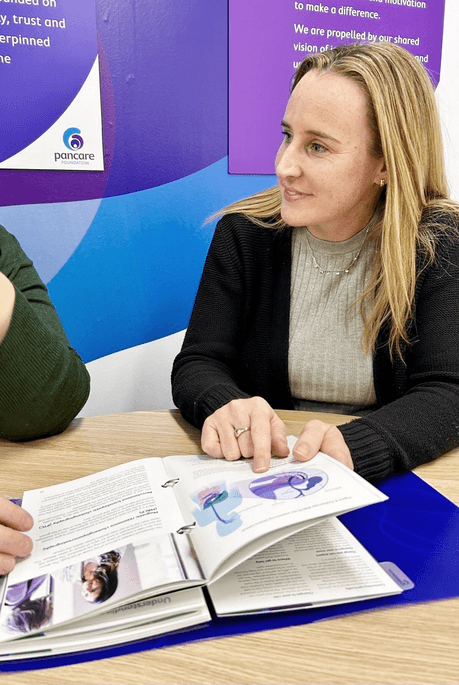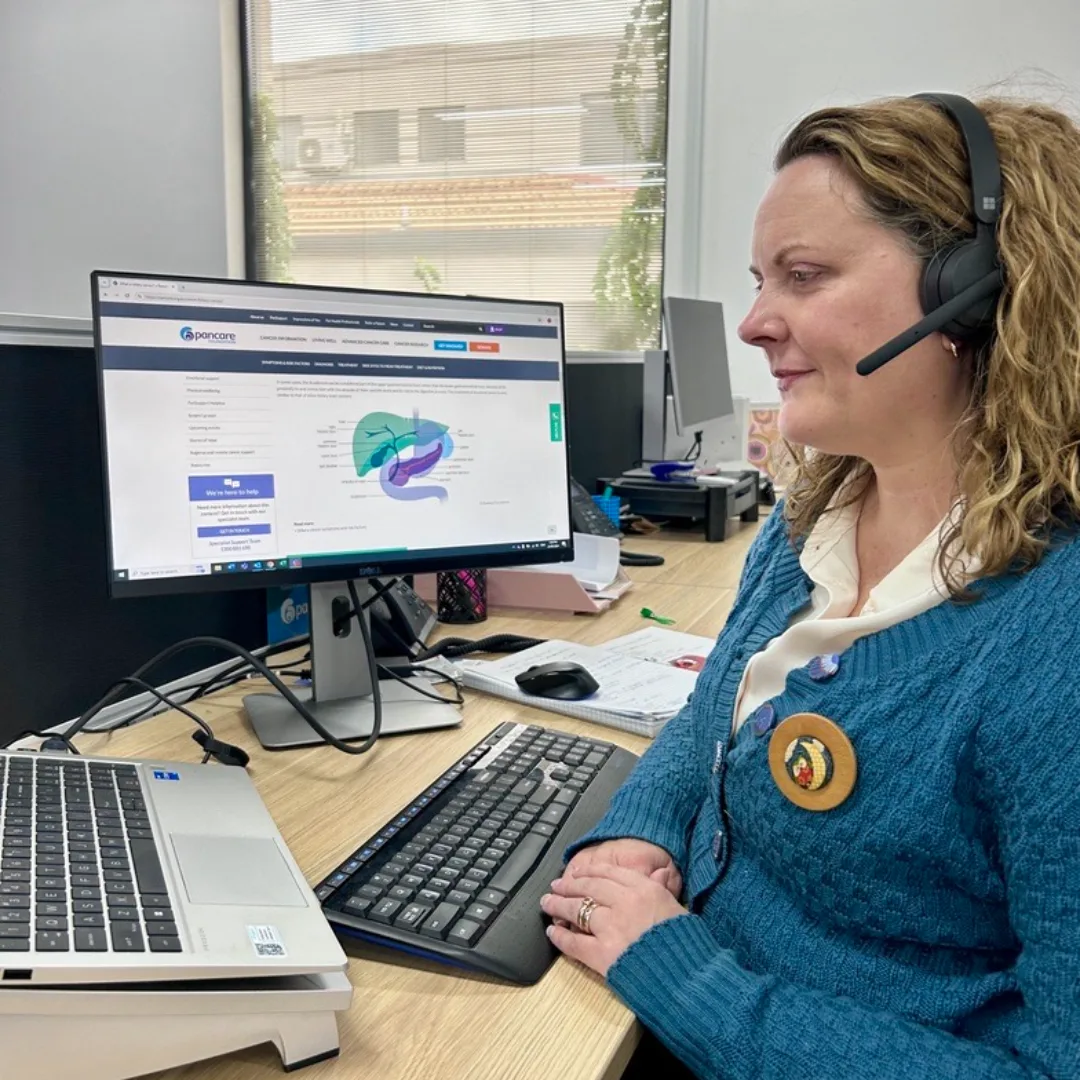Living with pancreatic cancer
Pancreatic cancer affects more than just your physical health. It can also take a toll on your emotional wellbeing, your relationships and the practical aspects of your day-to-day life.
Living well with pancreatic cancer means managing symptoms and side effects, taking care of your emotional health, eating well, staying as active as you can, and getting the practical and financial support you need.
This section provides information and practical advice to help you live as well as possible with pancreatic cancer.
Managing symptoms and side effects
Pancreatic cancer and its treatments can cause a range of symptoms and side effects that affect how you feel and what you can do each day.
Managing these symptoms well can help you feel stronger, eat better, sleep better, and enjoy life more.
Your healthcare team is there to help you manage any changes. You don’t have to cope alone.
Common symptoms and side effects
Common side effects of pancreatic cancer treatment may include:
| Surgery | Chemotherapy and biological therapies | Radiation therapy |
|
|
|
Below are some strategies for managing some of the significant side effects.
Managing pain
Pain is common with pancreatic cancer, but it can be managed. It’s important to talk to your treatment team about your pain so that they can help.
Strategies for managing pain can include:
- Pain relief medicine: like Panadol, anti-inflammatory medicines, or stronger morphine-based medicines.
- Nerve blocks: This is a procedure that blocks pain signals from the pancreas.
- Complementary therapies: Things like aromatherapy, reflexology, or relaxation therapy may also provide relief.
If pain is your main issue, you may be referred to a pain specialist. A psychologist or social worker can also teach you coping strategies to help manage pain.
Good pain control helps you feel better, sleep better, eat better, and enjoy life more.
Managing fatigue
Feeling tired is one of the most common side effects of cancer and its treatment.
Strategies for managing fatigue can include:
- planning your day to prioritise the most important activities first
- resting when you need to
- asking for and accept help from others
- eating well and drinking enough fluids
- keeping active or participating in gentle exercise
- maintaining a good sleep routine at night.
Talk to your treatment team if your fatigue is extreme and impacting on your daily life.
Managing digestive problems
Pancreatic cancer and its treatment can affect how your digestive system works.
If your pancreas isn't making enough digestive enzymes, you may need to take pancreatic enzyme supplements, like Creon®. These help you digest food properly.
Signs you might need enzyme supplements include:
- pale, floating, oily, foul-smelling poo
- more frequent or loose bowel movements
- bloating or tummy pain
- excess wind (farting)
- poo that's difficult to flush or sticks to the toilet
- losing weight even though you're eating enough
- feeling weak and tired
Your doctor or dietitian will help you work out the right dose and when to take these supplements.
Managing nausea
Nausea is a common side effect of pancreatic cancer treatment.
Some strategies to manage nausea include:
- Taking anti-sickness medicine as prescribed by your doctor.
- Eating small, frequent meals rather than large meals often helps.
- Avoiding foods with strong smells, and consider cold or room-temperature foods if hot foods make you feel worse.
- Sipping fluids throughout the day rather than drinking large amounts at once.
- Using ginger. Try ginger tea, ginger biscuits, or crystallised ginger.
- Getting fresh air can also help relieve nausea.
When to contact your treatment team
Contact your treatment team urgently if you have any side effects or symptoms that worry you, or if you notice:
- severe or uncontrolled pain
- a high temperature (fever) over 38°C
- uncontrolled vomiting or diarrhoea
- signs of infection (redness, swelling, discharge from wounds)
- severe weakness or dizziness
- difficulty breathing
- blood in your vomit or poo
Your emotional and mental health
As time passes from your initial diagnosis you will find yourself dealing with the wider emotional impacts of pancreatic cancer and its treatment. Everyone finds their own ways of coping, but whatever you do it is important to take care of yourself.
Your emotions
It's normal to experience a range of emotions after a pancreatic cancer diagnosis.
You might feel:
- shock and disbelief, especially when first diagnosed
- fear and anxiety about treatment, the future, or cancer coming back
- angry at the unfairness of the situation
- sad about changes to your life and future
- guilty about being a burden on others or about past lifestyle choices.
- a loss of control, like cancer is controlling your life
- hope when treatment goes well or you have good days
- gratitude for support from loved ones and healthcare teams.
All of these feelings are normal. You may feel different emotions at different times, and that's okay too.
Ways to support your emotional wellbeing
There are many strategies than can help you manage the emotional impact of living with pancreatic cancer. What works for someone else may not always work for you. It is important to keep this in mind during your treatment.
- Talk about your feelings: It can help to share your worries with family, friends or a support group of people who understand what you are going through.
- You could consider speaking with a trained counsellor who specialises in supporting people with pancreatic cancer via the Pancare Support Helpline.
- Practice relaxation: Simple relaxation techniques can help you cope with stress, pain and anxiety. Having a warm bath, deep breathing or listening to soothing music are easy things to do at home.
- Stay connected: Social connections are important for emotional health. Try to spend time with people who make you feel good and accepted. It's okay to accept help and support from others. You don't have to do everything alone.
- Focus on what you can control: While you can't control everything about having cancer, there are things you can influence. Try making plans and setting small, achievable goals that give you something positive to focus on. Do activities you enjoy when you have the energy. Keeping some routines in your day can help you feel more normal. You can also make decisions about your care and treatment, which helps you feel more in control of your situation.
- Look after your physical health: Your physical and emotional health are connected. Try to eat as well as you can, and stay as active as your energy level allows. Getting enough rest and sleep is important, though this can be difficult when you're worried.

When feelings become overwhelming
While it's normal to feel anxious, sad, or worried, sometimes these feelings can become overwhelming. You might need extra support if you're feeling very anxious or worried most of the time.
Signs that you might need extra help from your healthcare team include:
- difficulty sleeping or sleeping too much
- loss of interest in things you usually enjoy
- difficulty concentrating or making decisions
- withdrawing from family and friends
- feeling hopeless about the future
- having physical symptoms like a racing heart, difficulty breathing, or panic attacks
- having thoughts of self-harm all mean you should reach out for help.
If you're experiencing any of these, please talk to your healthcare team, GP, or a counsellor. Help is available, and you don't have to cope alone.
Fear of cancer returning
After finishing initial treatment for pancreatic cancer, many people worry about the cancer coming back. This is a normal fear.
It’s important to focus on follow-up care and the things you can control rather than what you can't.
Talking about your worries can help and connecting with others who understand these fears can be reassuring.
If this fear is affecting your daily life, talk with your healthcare team.
Diet and nutrition
Eating can become harder when you have pancreatic cancer. The cancer itself, as well as treatments like surgery or chemotherapy, can change how your body digests food and uses energy. Good nutrition helps you keep your strength, manage side effects, and recover more quickly.

The role of the pancreas in digestion
The pancreas has two main jobs in your body:
- It produces enzymes that help you to digest and absorb food.
- It produces hormones, including insulin and glucagon, which help to control your blood sugar levels.
Any changes to the pancreas, including those caused by pancreatic cancer and its treatment, can result in problems with blood sugar control and/or digestion.
Eating well during pancreatic cancer treatment
During treatment for pancreatic cancer, you may lose appetite, feel tired, or find food tastes different.
These strategies may help you maintain good nutrition during treatment.
- Eat small, frequent meals or snacks instead of three big meals.
- Try to include protein and healthy fats in your meals (for example, meat, dairy, nuts or oils).
- Use full-fat or energy-rich foods. Now is not the time to limit ‘rich’ foods if your body needs calories.
- Stay active, even just gentle walking, to help your appetite and digestion.
- Talk to a dietitian. They are experts in helping people with cancer eat well under changing conditions.
- Be careful with supplements and vitamins. Always check with your doctor or dietitian first.
These strategies help manage side effects, support healing, and keep your strength during treatment.
Digestive changes and enzyme support
Dumping syndrome
If you have had a Whipple’s procedure, you may have had the lower part of your stomach removed. This may include the valve, or sphincter, that helps control the flow of food from your stomach to your small intestine. Removal of this valve can result in a condition called Dumping Syndrome.
Dumping Syndrome can occur when food moves from your stomach into your small bowel too quickly.
It can present as nausea, cramps and diarrhoea approximately 10 to 30 minutes after eating or sweating and dizziness one to three hours after eating.
Be sure to speak to your doctor or dietitian if you are experiencing any of these symptoms.
Some tips to prevent Dumping Syndrome include:
- avoid large meals
- avoid sugary drinks and sweets
- choose meals high in protein to slow the digestion of carbohydrates
- keep drinks separate to meals.
Malabsorption and pancreatic enzyme replacement therapy
Changes to your pancreas, from either the cancer or the treatment, can mean that your body does not produce enough (or any) pancreatic enzymes. This can lead to poor digestion and absorption of food, known as pancreatic exocrine insufficiency.
Signs can include:
- floating, pale, foul smelling stools
- more frequent or loose bowel movements
- bloating or pain (because the large bowel is not used to dealing with these undigested nutrients)
- excess flatulence (farting)
- stools that are oily in appearance
- stools that are difficult to flush and stick to the toilet bowel
- not gaining weight or losing weight, even if you feel you are eating enough
- fatigue and weakness.
If this happens, your doctor or dietitian may recommend pancreatic enzyme supplements, such as Creon®. These come in capsules that replace the enzymes your body is missing, helping you digest food properly and absorb nutrients.
You’ll usually take them with meals and snacks. Your care team will explain how many capsules to take and when, depending on what you’re eating.
Working with a dietitian
A dietitian who specialises in cancer care can help you understand your nutritional needs and manage digestive symptoms. They'll teach you about pancreatic enzyme supplements and help you find foods that work for you.
Ask your healthcare team for a referral to a dietitian. This is one of the most important things you can do to help yourself feel better.
Living well with pancreatic cancer
Living with pancreatic cancer doesn’t mean putting your life on hold.
While treatment and symptom management are important, so is finding ways to live fully – to stay active, connect with others, and do the things that bring you joy. Small steps to care for your body and mind can make a big difference every day.

Physical activity and exercise
Staying active, even in gentle ways, can help reduce tiredness, strengthen muscles, improve mood, and help you sleep better. Regular movement also supports digestion and independence.
The right amount of exercise for you depends on how you feel, where you are in your treatment, and your general health.
Even light activity helps — such as a slow walk, stretching at home, gentle swimming, or light housework. Do what feels comfortable, and rest when you need to.
Before starting any new exercise, talk to your healthcare team. An exercise physiologist or physiotherapist can design a safe program tailored to your needs.
Start slowly, build up gradually, and listen to your body.
Tips for staying active
- Choose activities you enjoy
- Exercise with a friend or family member
- Set small, realistic goals
- Celebrate progress — no matter how small
- Be flexible — some days will be better than others
- Don’t push through pain or severe fatigue
Relationships and communication
Cancer affects not only you but also the people close to you. Open, honest communication helps maintain connection and support.
Talking to loved ones
Share how you’re feeling and let people know how they can help. You don’t need to protect others by hiding your emotions. It’s okay to talk about everyday things. Not every conversation has to be about cancer.
When relationships feel strained
Sometimes people don’t know what to say or how to help, and this can cause tension or misunderstanding.
If relationships feel difficult, consider:
- talking with a counsellor or social worker
- joining a support group to connect with others who understand
- family or couples counselling to work through changes together.
Intimacy and sexuality
Cancer and its treatment can affect intimacy and sexuality. This might include loss of interest in sex, physical changes that affect sex, feeling less attractive, fatigue affecting desire, anxiety or depression affecting intimacy, or physical discomfort.
These changes are common, and it’s okay to talk about them. Speak with your partner about how you feel and what you need. Intimacy isn’t only about sex. Closeness, affection, and emotional connection all matter.
You can also talk to your GP, a psychologist, or a sexual health therapist for advice and support.
Tips that may help
- Talk openly with your partner about what feels comfortable
- Focus on closeness and touch, not just sexual activity
- Wait until you feel ready — there’s no rush
- Choose times when you have more energy
- Be patient with yourself and your partner as you adjust.

Social connections
Staying socially connected supports your emotional health and sense of belonging.
Keep in touch with friends and family in ways that suit your energy.
Join a support group or online community where you can share experiences and learn from others.
If social outings feel challenging, plan ahead. Take enzyme supplements or medicines with you, know where toilets are, and choose smaller gatherings if big crowds feel overwhelming. It’s okay to say no or leave early if you need to rest.
Maintaining independence
Doing things for yourself helps you feel more in control.
Use aids like walking sticks or grab rails if they help, and accept help when needed.
Plan activities for times of day when you have the most energy, and focus on what you can do rather than what you can’t.
Finding meaning and purpose
Many people find comfort in spending time on things that matter most – whether that’s hobbies, family, faith, creativity, or being in nature.
You might enjoy gentle yoga, meditation, music or art therapy, reading, gardening, or spiritual activities.
Small moments of joy can make a big difference.
Practical support during pancreatic cancer
When you’re receiving treatment for pancreatic cancer, you’re bound to feel tired, exhausted sometimes, so be kind to yourself. Make sure you rest, prioritise what you want or need to do, accept offers of help and ask for help if you need to.
Practical issues won’t be the first thing on your mind, but dealing with things like your work or financial situation is important, so they do not become a source of stress.
Work and employment
Your diagnosis will affect your ability to work, even if it is only temporarily such as when having treatment.
It's important to talk to your employer about your diagnosis and likely time off work, any adjustments you might need, and your rights and entitlements.
Your options may include taking sick leave, reducing your hours, working from home, making changes to your role or duties, taking extended leave, or leaving work temporarily or permanently.
If you can't continue working, consider what income support you're entitled to, whether you can access your superannuation early, whether you have income protection insurance, and what other financial support is available.
Financial support
Cancer treatment can be expensive. Costs may include appointments, scans, medicines, travel, parking, and time off work.
There are government programs and community supports that can help reduce the financial burden.
Government assistance
You may be eligible for payments through Services Australia, such as:
- Carer Payment or Carer Allowance
- Disability Support Pension
- Essential Medical Equipment Payment.
People living with long-term disability may also qualify for help through the National Disability Insurance Scheme (NDIS).
Other supports
- Register for the Medicare Safety Net and PBS Safety Net to reduce out-of-pocket costs for visits and medicines.
- If you have private health insurance, ask what your policy covers and what excess or gap fees apply.
- If you’re struggling with loan or credit payments, contact your bank early to discuss payment relief options
- In some cases, you may be able to access superannuation early on medical grounds. Speak to your fund, accountant or the Australian Taxation Office before applying.
A qualified financial planner can help you review your income, super, and insurance. You can find an accredited adviser through the Financial Planning Association of Australia.
Pancare also provides limited financial assistance for eligible patients and carers — call 1300 881 698 or email support@pancare.org.au.
Legal considerations
It can feel confronting, but getting your legal documents in order gives peace of mind and helps your loved ones understand your wishes.
- A power of attorney is a legal document that lets someone you trust make decisions on your behalf if you become too unwell to do so. This can cover financial, legal, and personal matters, including health-care decisions.
- A Will sets out what happens to your property, finances, and personal items after your death. It can also include guardianship plans for children and your preferences for funeral arrangements.
- Estate planning means organising your assets, debts, and wishes ahead of time so everything is clear and simple for your loved ones.
- An advance care plan lets you record your preferences for future medical treatment. You can write these in an Advance Care Directive (sometimes called a “living will”), which only takes effect if you are unable to make or communicate decisions yourself.

Where to get help
Managing the practical side of cancer can feel overwhelming, but you don’t have to do it alone.
You can:
- Talk to a social worker or cancer care coordinator at your treatment centre
- Call Pancare Foundation on 1300 881 698 or visit pancare.org.au/living-well
- Contact the Cancer Council on 13 11 20 for advice on financial, legal, or work-related issues
Support and resources
You don't have to face pancreatic cancer alone. Many services and resources are available to support you and your family.
Pancare Support
Pancare Support is Pancare Foundation's dedicated support service for people affected by pancreatic and other upper gastrointestinal (GI) cancers.
- Pancare Support Helpline is available Monday to Friday, 9am to 5pm. You can speak with a specialist upper GI nurse. You can book an appointment or alternatively call 1300 881 698.
- Pancare Support Groups are online or face-to-face support groups for people living with an upper GI cancer. You can share experiences with others who understand and learn from others' experiences.
- Carer Support Groups provide support for carers and family members. These are held online on the last Thursday of each month from 11am-12:30pm (AEST).
- Specialist Presenter-led Groups are monthly combined patient and carer groups that feature specialist presenters on topics like diet, managing side effects, and survivorship. These are held online on the third Thursday of each month from 11am-12:30pm (AEST).
- Financial assistance: Financial support is available for eligible patients, carers, and families. This can help with costs like medical equipment, bills, and specialist services.
- Educational resources: Pancare Foundation provides information booklets and guides, online resources, and a Living Well Series with expert information.

Cancer Council telephone support groups
The Pancreatic Cancer Telephone Support Group, run by Cancer Council New South Wales, is a free, professional facilitated support group, you can access from the comfort of your home or workplace, wherever you are in Australia. They are open groups and you can join in whenever you feel well enough, on an ongoing basis.
How does it work?
Members are telephoned by Cancer Council so there are no costs to participate. You can be called on a landline or a mobile.
To find out more, call Cancer Council NSW national referral line on 1300 755 632 or email tsg@nswcc.org.au
- The Pancreatic TSG meets the first and third Wednesdays of the month from 1.30pm – 2.30pm (EST) and accepts new members at any time.
- The Advanced Cancer TSG meets the first and third Tuesday of the month from 1.30pm – 2.30pm (EST) and is for people with a variety of cancers, including pancreatic cancer.
- The Carers’ TSG meets the second and fourth Wednesdays of the month from 1.30pm – 2.30pm (EST) and is for people caring for someone with any cancer, including pancreatic cancer.
- The Life After Loss TSG for people whose loved one has died from a cancer-related illness. This is ‘closed’ six-session format, running weekly held across specific dates TBC.
The Telephone Support Group program is offered by Cancer Council NSW in conjunction with Cancer Council Victoria.
Your healthcare team
Your healthcare team is a key source of support. Don't hesitate to contact them with questions or concerns.
- Specialist cancer nurses provide information and education, help coordinate your care, offer emotional support, and are available for questions between appointments.
- Social workers can help with practical issues, connect you with financial support, provide emotional support and counselling, and help you navigate the healthcare system.
- Dietitians give specialist advice on nutrition, help with managing eating difficulties, provide advice on enzyme supplements, and offer ongoing nutritional support.
- Psychologists or counsellors provide support for emotional and mental health, teach strategies for coping, support you with anxiety and depression, and are available for you and your family.
- Exercise physiologists or physiotherapists design safe exercise programmes, help maintain strength and fitness, and support physical recovery.
- Pain specialists provide specialised pain management when pain is difficult to control.
- Palliative care teams help with symptom management and support for quality of life. They're available earlier than many people think - not just for end-of-life care. They can work alongside your cancer treatment team.
Online resources and information
Stick to reputable sources when looking for information online. Be wary of miracle cures or treatments that sound too good to be true.
Check when information was published as medical knowledge changes over time.
Discuss anything you read online with your healthcare team before making decisions.
Some reliable online sources include:
- Pancare Foundation (www.pancare.org.au) provides information about pancreatic cancer, support services, research and clinical trials, and resources and booklets.
- Cancer Council (www.cancer.org.au) offers information about all types of cancer, booklets and fact sheets, and videos and webinars. They also have Optimal Care Pathways available to show patients what they can expect from best practice cancer care.
- For clinical trials information, visit australiancancertrials.gov.au (Australian Cancer Clinical Trials) or gicancer.org.au (Australasian Gastro-Intestinal Clinical Trials Group).
How to find support services
The best place to start is with your healthcare team. They can refer you to appropriate services based on your needs.
You can also contact Pancare’s PanSupport Helpline to speak with a specialist Upper GI Cancer Nurse.
- You can book a 45-minute appointment on Monday to Friday, 9am – 5pm (AEST/AEDT) for the cost of a local call.
- Alternatively you can call us on 1300 881 698 or simply send us an email pansupport@pancare.org.au
Want to talk?
Speak to an upper GI cancer nurse or counsellor, we're here to provide you with the support you need. Support available to anyone impacted by upper gastrointestinal (GI) cancer. Monday to Friday, 9am-5pm.
